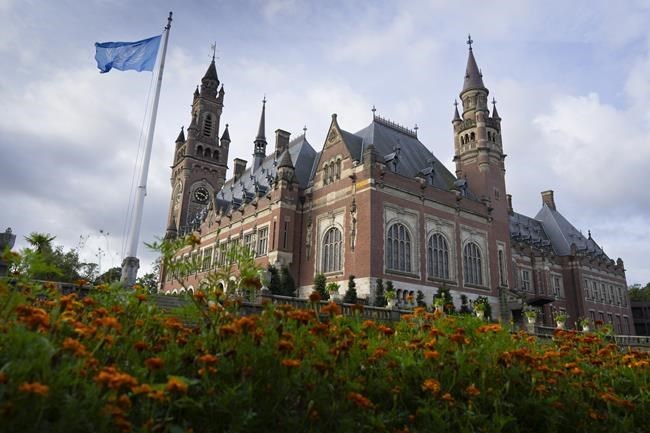THE HAGUE, Netherlands (AP) — The United Nations’ top court will issue a decision Friday on South Africa’s request for interim orders in a genocide case against Israel, including that Israel halt its offensive in Gaza.
The decision is a preliminary stage of a case filed by South Africa at the International Court of Justice alleging that Israel’s military action in its war with Hamas in Gaza amounts to genocide. Israel strongly rejects the accusation and has asked the court to throw out the case.
The court in The Hague, Netherlands, announced the timing of the interim ruling on Wednesday. South Africa's Foreign Ministry said Foreign Minister Naledi Pandor would travel to The Hague to represent the country at Friday's ruling.
Israel launched its massive air and ground assault on Gaza soon after Hamas militants stormed through Israeli communities on Oct. 7 and killed some 1,200 people, mainly civilians.
Israel often boycotts international tribunals and U.N. investigations, saying they are unfair and biased. But the country’s leaders sent a high-level legal team to two days of hearings earlier this month. That was a sign of how seriously they regard the case and an indication of likely concerns that any court order to halt operations would be a major blow to the country’s international standing.
If the court grants some or all of South Africa’s eight requests for so-called provisional measures, it is unclear if Israel will comply.
Israeli Prime Minister Benjamin Netanyahu has vowed to press ahead with the offensive until “complete victory” against Hamas, which started the war with its assault across the border on Oct. 7, killing some 1,200 people and abducting another 250.
Gaza’s Health Ministry says the offensive has killed at least 25,490 people — the majority women and children — and wounded another 63,354. Its count does not differentiate between civilians and combatants. U.N. officials have expressed fears that even more people could die from disease, with at least one-quarter of the population facing starvation.
Israel’s attacks have driven nearly 85% of Gaza’s population of 2.3 million from their homes. Much of northern Gaza, including Gaza City, has been reduced to rubble.
Friday's ruling will not be on the merits of South Africa’s claims. Israel can still challenge the court’s jurisdiction and the admissibility of the case before any hearings on the legal merits of the case.
For it to order so-called “provisional measures," the 17-judge panel must decide that the court appears to have jurisdiction in the case, that there is a dispute between South Africa and Israel about the 1948 Genocide Convention and that there is an urgent need to order emergency measures while the case continues.
At hearings earlier this month, South African lawyers said that acts by Israel’s military and statements by senior officials demonstrated intent to commit genocide against Palestinians in Gaza.
“The scale of destruction in Gaza, the targeting of family homes and civilians, the war being a war on children, all make clear that genocidal intent is both understood and has been put into practice. The articulated intent is the destruction of Palestinian life,” said lawyer Tembeka Ngcukaitobi.
He said the case’s “distinctive feature” was “the reiteration and repetition of genocidal speech throughout every sphere of the state in Israel.”
Malcolm Shaw, part of Israel’s legal team at hearings in The Hague, rejected the accusation of genocidal intent and called remarks cited by South Africa “random quotes not in conformity with government policy.”
Israeli legal advisor Tal Becker told the court that the country is fighting a “war it did not start and did not want.”
“In these circumstances, there can hardly be a charge more false and more malevolent than the allegation against Israel of genocide,” he added, noting that the horrible suffering of civilians in war was not enough to support an allegation of genocide.
The case strikes at the national identity of Israel, which was founded as a Jewish state after the Nazi slaughter of 6 million Jews during World War II.
South Africa’s own identity is key to it bringing the case. Its governing party, the African National Congress, has long compared Israel’s policies in Gaza and the West Bank to its own history under the apartheid regime of white minority rule, which restricted most Black people to “homelands” before ending in 1994.
Mike Corder, The Associated Press

